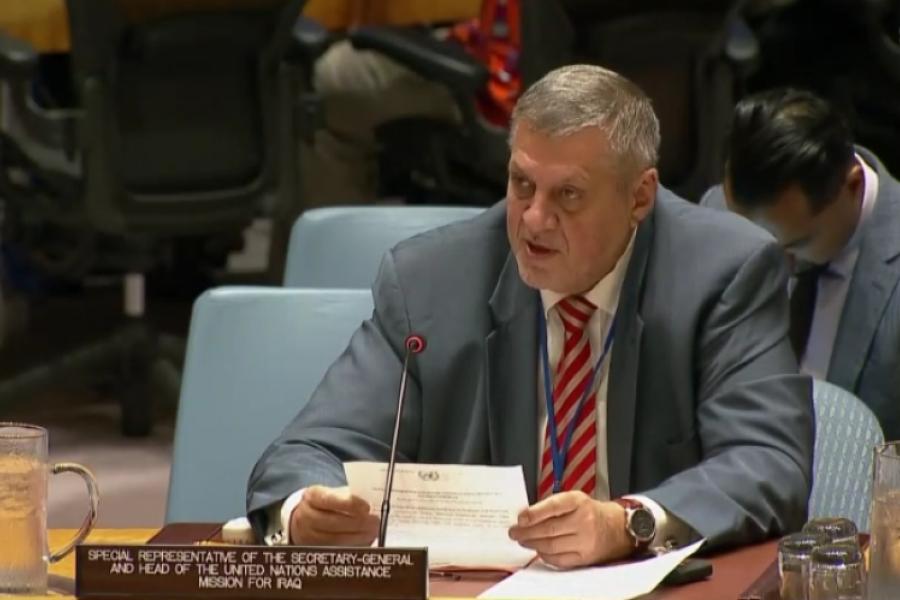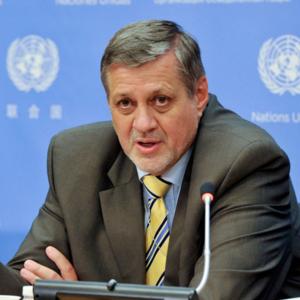Briefing to the Security Council by SRSG Ján Kubiš New York, 8 August 2018 (AS DELIVERED) | BTSC
Madam President,

Following the parliamentary elections on 12 May 2018, complaints and allegations of electoral fraud and mismanagement resulted in the decision to conduct a partial manual ballot recount.
The situation has been further complicated by demonstrations that have started on 8 July 2018 in Basra Governorate and spread to other predominantly Shi’a southern governorates and Baghdad. The protesters are mainly young people with complaints over the lack of delivery of basic services, shortages of electricity, lack of jobs and pervasive corruption. Their messages, however, have swiftly become more politicised, criticising national leaders and successive governments for ignoring the needs of the people and social justice, expressing their deep and growing frustration with old political leaders and the political system based on sectarian quotas they deemed corrupt, dysfunctional and stagnant, and deploring foreign interference in the internal matters of Iraq.
It is to be noted that many of their demands echo requests from demonstrations several years ago that engulfed predominantly Sunni governorates.
The leader of the Fatah Alliance, Hadi al-Ameri, publicly acknowledged that politicians had failed the people, reconfirming the need to reform the political process and to establish a government of services and not of privileges for political parties. The head of the Sa’iroun Alliance, cleric Muqtada al-Sadr, who himself led massive public protests in Baghdad as recently as 2016, with similar demands as today’s demonstrations urged suspension of government formation talks until the legitimate demands of protesters were met.
The historic low voter turnout witnessed during the 12 May parliamentary elections when some 60% of eligible voters did not participate had already delivered a strong message of dissatisfaction with the current state of management of public affairs.
Madam President,
In his Friday’s sermon on 27 July, the Supreme Religious Authority Grand Ayatollah Ali al-Sistani called for early formation of a future government comprising competent, honest members and a Prime Minister who should be decisive and courageous enough to fight the financial and administrative corruption that is the root cause of most of Iraq’s problems. The new Prime Minister should have authority, take responsibility for his cabinet. The new Council of Representatives should abolish privileges or amend laws that do not achieve justice and equality for the people. If the new government failed to abide by its commitments and to deliver on its reform programme or if the new Council of Representatives or the Judiciary did not act appropriately, the people supported by “all forces of good” of the country would have no other option but to develop other ways to impose their will on the officials, warned al-Sistani.
On 30 July, Prime Minister Abadi met in Baghdad with Kurdistan Regional Government Prime Minister Nechirvan Barzani. They underlined the need to expedite formation of the next government, and to resolve all issues between Erbil and Baghdad based on the Iraqi constitution.
Madam President,
I note with appreciation that Prime Minister Abadi has made major efforts to provide swift and tailored responses to legitimate popular demands, bringing a temporary relief to people living under strenuous conditions. These resolute measures, however, remain insufficient to address the depth of people’s needs and concerns. I urge political leaders to listen to the voice of the people, and accelerate the process of formation of a patriotic, inclusive and non-sectarian government with a strong and empowered Prime Minister that will prioritise political, economic and social reforms, investments, creation of jobs, reconciliation, justice, equality, and accountability, and good governance, including the fight against corruption, that will put all the armed formations under the strict control of the state and will resolutely act against insubordinate militias and criminal gangs, and that will ensure full sovereignty and real independence of Iraq, free from foreign interference.
Madam President,
Based on the Election Law amended on 6 June, the Board of Judges that was assigned to supervise the electoral process adopted modalities for the recount of ballots that were subject to complaints or allegations of fraud, in line with the Federal Supreme Court ruling of 21 June.
On 6 August, the Board of Judges announced that the manual recount has been completed. The process has moved on to results tabulation to generate the provisional election results. Throughout the recount process, an Electoral Monitoring Team from UNAMI, complemented by UNDP experts, provided oversight, advice and assistance.
I welcome the orderly, transparent, credible and well-organised conduct of the recount. I commend the Board of Judges for its hands-on impartial work. I applaud the dedication and professionalism of all recount staff, both Independent High Electoral Commission and judiciary personnel. The recount has increased public confidence in the electoral process and the election results.
Madam President,
My Deputy for Political Affairs and Electoral Assistance, Alice Walpole and myself met with numerous political leaders, women, minority and civil society actors to promote meaningful participation of women in the political, economic and social life, including their representation at the highest levels in political and decision-making structures, including in the future Government and Council of Representatives.
On 31 July, UNAMI met with members of the National Team to discuss progress and challenges on implementation of the Iraqi National Action Plan (NAP) on UNSCR 1325 (2000), including lack of a dedicated budget to support NAP activities.
Last week, UNAMI facilitated a meeting with women leaders, civil society, activists and elected women that adopted a consolidated vision of women’s demands for the inclusion of gender perspectives and gender equality considerations in the government programme. The recommendations are attached to this report.
This week, DSRSG Walpole chaired a UN meeting with Iraqi women expected to sit in the next Council of Representatives. The Iraqi women politicians undertook to work across the party divide, for example in establishing a Women’s Parliamentary Caucus and women’s platforms, in the development of government policies and strategies on increasing women’s participation and representation in politics, as well as gender mainstreaming in all parliamentary processes.
Madam President,
My Deputy for Humanitarian Affairs and Development, Marta Ruedas, convened on 19 July a meeting of the Development Cooperation Forum in Baghdad, where more than 20 international partners were presented with 61 UN Country Team projects that are ready for funding through the $1 billion Recovery and Resilience Programme (RRP). I urge Member States to support Iraq by accelerating delivery on the commitments made in Kuwait in February.
One year after the liberation of Mosul, UNMAS clearance teams have removed 43,700 explosive hazards in the city, including 1,000 improvised explosive devices (IEDs).
The United Nations Development Programme’s (UNDP) Funding Facility for Stabilisation (FFS) continued to support 2,361 projects, with successful completion of more than 1,000 in five governorates.
Since January, more than 684,000 displaced people have returned while just under two million Iraqis remain displaced as of 15 July 2018.
The security and protection environment remain volatile, posing serious protection risks to Iraqi civilians. Abductions, disappearances, detention, increased risks of sexual- and gender-based violence and violations of child rights continue. For many, a combination of these factors has led to secondary or repeated displacement.
As of 24 July, donors have contributed $324 million towards the Humanitarian Response Plan which is 57 percent of the plan’s requirement. In order to ensure that critical assistance to vulnerable communities is available, I appeal to the donor community to continue their generous funding.
Madam President,
The ongoing demonstrations in the southern governorates brought to the fore their long-neglected social, economic and development needs. The UNCT in Iraq is developing a strategy and programmes to scale up assistance.
Furthermore, it is expected that the water scarcity in the five southern governorates will increase over the coming months, putting about 25% of this 2 million population at risk of experiencing water service outage, water borne/related diseases and possible displacement.
As water is a shared resource between the people of Iraq, Turkey, Syria and Iran, I urge these parties to increase their cooperation in the efficient management of water resources.
Madam President,
Although tangible results in the search of Kuwaiti missing persons have yet to be achieved, the Iraqi Ministry of Defence continues to carry out excavation and exploration missions as well as efforts to identify new witnesses.
On 25 July, another session of the Tripartite mechanism took place in Kuwait. Repeated calls to the international community have prompted Member States in possession of satellite imagery from 1990-1991 to come forward with information that could assist in identification of burial locations. Nevertheless, procurement of field equipment, provision of forensic, DNA, and anthropological trainings, capacity-building for Iraqi and Kuwaiti technical teams remain a major challenge and require further assistance of the international community.
I am also pleased to report that the two sides are close to setting a date for the official transfer of a significant consignment of Kuwaiti property.
Speech by


